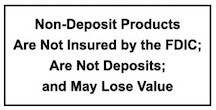Individual Retirement Account
An Individual Retirement Account is an account that provides tax advantages for retirement savings. Shelby County State Bank offers 12 month, 18 month, 2 year, 3 year, and 5 year certificates for IRA’s with a minimum deposit of $1,000, and a savings IRA with a minimum deposit of $100.
Types:
Traditional IRA-Contributions are often tax deductible (often simplified as “money is deposited before tax” or “contributions are made with pre-tax assets”). All transactions and earnings within the IRA have no tax impact and withdrawals at retirement are taxed as income.
Roth IRA-Contributions are made with after-tax assets, all transactions have no tax impact and all withdrawals are usually tax-free.
Sep IRA-Allows an employer (typically a small business or self-employed individual) to make retirement plan contributions into a Traditional IRA established in the employee’s name instead of a pension fund in the company’s name.
Distributions: (the rules have changed)
Distributions on a traditional IRA may be taken at any time but there are limited circumstances when money can be withdrawn from the account without penalties. Unless an exception applies, money can typically be withdrawn penalty free as taxable income from an IRA once the owner reaches age 59 1/2. Also non-Roth owners must begin distributions of at least the calculated minimum amounts (also known as RMD). If you reach age 70 1/2 in 2020 or later, you must take your first RMD by April 1 of the year after you reach 72. The age to start taking RMDs increased to 73 in 2023 due to the SECURE 2.0 Act, which took effect on January 1, 2023. If the required minimum distribution is not taken the penalty is 50% of the amount that should have been taken.
There are several exceptions to the rule where penalties apply to distributions before 59 1/2. Each exception has detailed rules that must be followed to be exempt from penalties. This group of penalty exceptions are popularly known as hardship withdrawals. The exceptions include:
- The portion of medical expenses not reimbursed are more than 7.5% of adjusted gross income
- Distributions that are not more than the cost of medical insurance while unemployed
- Disability (defined as not being able to engage in any substantial gainful activity)
- Amounts distributed to beneficiaries of a deceased IRA owner
- Distributions in the form of an annuity
- Distributions that are not more than the qualified higher education expenses of the owner or their children or grandchildren
- Distributions to buy, build or rebuild a first home ($10,000 lifetime maximum)
- Distribution due to an IRS levy of the plan
There are a number of other important details that govern different situations.
For Roth IRA’s only contributed funds can be withdrawn before age 59 1/2 without penalty (or tax) on a first in first out basis and a penalty would apply only on any growth (the taxable amount-interest) that was taken out before 59 1/2 where an exception didn’t apply. Amounts converted from a traditional to a Roth IRA must stay in the account for a minimum of 5 years to avoid having a penalty on withdrawal of basis unless one of the above exceptions applies.


